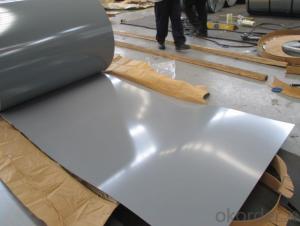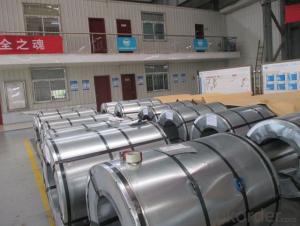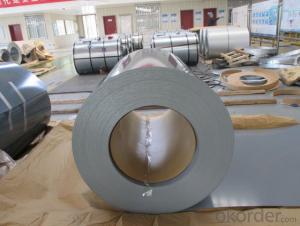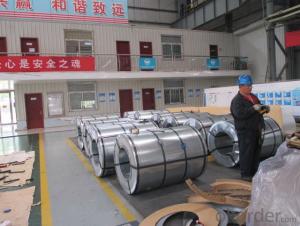PREPAINTED STEEL COIL JIS G 3312 CGCC WITH LOW PRICE
- Loading Port:
- Shanghai
- Payment Terms:
- TT OR LC
- Min Order Qty:
- 25.00 m.t.
- Supply Capability:
- 10000 m.t./month
OKorder Service Pledge
OKorder Financial Service
You Might Also Like
PREPAINTED STEEL COIL
Packaging & Delivery
Packaging Detail: seaworthy export package
Delivery Detail: on request
Specifications
1. more than 10 years’ experience on this field
2. advanced equipments
3. competitive price
4. soonest delivery
Product Description :
Commodity
PREPAINTED STEEL COIL
Technical Standard: JIS 3312
Grade:CGCC
Types:Commercial / Drawing / Deep Drawing / Structural quality
Width: 900mm/1000mm/1219mm/1200mm/1220mm/1250mm
Thickness: 0.2mm~4.0mm
Type of coating: galvanized
Zinc coating: Z40-275g/m2,Z40-Z450g/m2
ID coil: 508mm or 610mm
Coil weight: 3-10/MT per coil
Package: Properly packed for ocean freight exportation in 20''container
Application:: home appliances, constructions, building, machineries
Our Advantages :
1. Expertise:
More than 10 years of manufacture: we know how to properly handle every step of production.
2. Competitive price:
We can offer competitive prices to our customers.
3. Accuracy:
We have excellent technicians and leaders, which can ensure our products are exactly what you want.
4. Materials:
All galvanized steel coils are made of high-quality raw materials.
5. Certificate:
Our products are certified by ISO9001.
6. Productivity:
We have large-scales of production lines,, which can guarantee all your orders will be finished in earliest time.
Hr CGL Technical Process:
Coil loading-> uncoiling-> cutting-> welding-> entry accumulator-> Heating and deoxidization-> galvanizing-> air cooling->water quenching-> air dryer-> tension leveler-> Passivation->air dryer->exit accumulator-> oiling-> cutting-> recoiling->coil unloading-> packing
The furnace heating style: improved Sendzimir heating technology
Hourly output: max.76.3t/h
Process after coating: tension leveling, Passivation or oiling
Our Service
Our quality
Test Equipments of Prepainted Galvanized Steel Coil : Salt-spray tester; Atomic absorption spectrophotometer; Rockwell typer hardness tester; Tensile test machine; Metrohm titration; Laboratory Bend test machine.
Our packing
Properly packed for ocean freight exportation in 20''container, galvanized metal fluted rings on inner and outer edges, galvanized metal & waterproof paper wall protection disk, galvanized metal & waterproof paper around circumference.
R&D department
R&D department concentrates on researching and developing reliable products with best quality. The quality department test and control every process of production to guarantee the best quality of product
- Q:How do steel coils compare to other materials like aluminum or copper?
- When comparing steel coils to other materials like aluminum or copper, it is evident that they possess both advantages and disadvantages. One primary advantage of steel coils lies in their remarkable strength and durability. Steel is renowned for its high tensile strength, enabling it to withstand heavy loads and high stress without any deformation. As a result, steel coils are highly suitable for various applications that demand robust and resilient materials, including construction, automotive manufacturing, and transportation industries. In contrast, aluminum and copper are generally softer and less strong than steel, rendering them less appropriate for heavy-duty tasks. Another advantage of steel coils is their cost-effectiveness. In comparison to aluminum or copper, steel is a relatively inexpensive material, making it a more accessible option for large-scale projects or mass production. Furthermore, steel is highly recyclable, contributing to its cost-effectiveness and sustainability. Nonetheless, steel coils do have some disadvantages when compared to aluminum or copper. One notable drawback is their weight. Steel is significantly denser than aluminum or copper, resulting in heavier steel coils that can be more challenging to handle and transport. This disadvantage can prove to be critical in industries where weight plays a vital role, such as aerospace or electrical applications. Additionally, steel coils are susceptible to corrosion, which is another disadvantage. While aluminum and copper possess natural corrosion resistance, steel is prone to rust and oxidation. Consequently, steel coils require proper protection and coating to prevent corrosion, which adds to the overall cost and maintenance requirements. In conclusion, steel coils offer exceptional strength, durability, and cost-effectiveness when compared to aluminum or copper. However, they are generally heavier and more prone to corrosion. Ultimately, the selection between steel, aluminum, or copper will depend on the specific application, budget, and project requirements.
- Q:What is the maximum temperature steel coils can withstand?
- The maximum temperature that steel coils can withstand varies depending on the specific grade and type of steel being used. Steel is known for its high heat resistance and can typically withstand temperatures ranging from 550°C to 1,100°C (1,022°F to 2,012°F), depending on the grade. However, it is important to note that prolonged exposure to high temperatures can cause steel to lose its structural integrity and result in permanent deformation or even failure. Therefore, it is crucial to adhere to the manufacturer's guidelines and specifications when determining the maximum temperature that steel coils can withstand in specific applications.
- Q:What are the common defects in steel coil surface finishes?
- Common defects in steel coil surface finishes include scratches, pits, roll marks, stains, and unevenness. These defects can be caused by various factors such as improper handling, processing issues, or equipment malfunction. These surface defects affect the aesthetics and quality of the steel coil, making it unsuitable for certain applications or requiring additional processing to rectify the defects.
- Q:I am going to be working as a mechanic at my school and I just wanted to know if I should get the steel toe boots or regular. I heard that steel toe boots can be dangerous and uncomfortable. The mechanics recommended getting steel toe to be safe but i'm not sure.
- Get soft toe boots because if something falls on the steel toe boots the metal goes thru the boot and cuts you.
- Q:How are steel coils used in the aerospace industry?
- Steel coils are used in the aerospace industry for various applications such as manufacturing aircraft components, including structural parts, engine components, and landing gear. These coils are often processed and formed into sheets, plates, or other desired shapes to meet the specific requirements of aerospace engineering. The high strength and durability of steel make it an ideal material for withstanding the demanding conditions and stresses experienced by aircraft during flight.
- Q:Hi,Well, I live near almost across the street from a forest, and my neighborhood is full of raccoons!!! Recently, I just purchased a bunny and have kept it at my cousin's house for the time being. He has a steel cage, and is about 6 months old. I am considering bringing him home and leaving him in the back yard with his steel cage. I am just afraid that raccoons can bite through the steel and get to him. So the question is... Is is possible for raccoons to bite through steel? Btw,Please don't answer hate comments about me being a bad rabbit owner. I simply want to know if raccoons can bite through steel. If it doesn't work out, the rabbit will stay at my cousins house until further notice. But please, I did not waste 5 points for unneeded answers. Thanksss!
- Well the raccoons can't bite through steel unless it is very thin steel, like aluminum foil thickness. But they have long arms and can reach into the cage so that would be my worry. They are also very clever so I don't know if it is safe for the bunny. That would depend upon the size of the cage and how hungry the raccoons are. The raccoons might be tempted to try to steal the bunny's food so that is a concern. Check with a pet shop owner or forester or someone like that who has knowledge about raccoons in the area.
- Q:What are the different types of steel coil grades?
- Various industries and applications utilize a range of steel coil grades. Some commonly employed types include: 1. Carbon Steel: This fundamental steel variant consists primarily of iron and carbon. Its widespread use in construction, automotive, and manufacturing industries stems from its exceptional strength and durability. 2. Stainless Steel: This specific steel variant incorporates chromium, which imparts corrosion resistance, making it appropriate for applications requiring protection against oxidation and staining. Industries such as food processing, chemical, and medical frequently employ stainless steel. 3. High-Strength Low-Alloy (HSLA) Steel: HSLA steel comprises trace amounts of alloying elements like copper, phosphorus, niobium, and vanadium. This steel variant offers superior strength and improved mechanical properties when compared to carbon steel, rendering it suitable for structural applications. 4. Galvanized Steel: This type of steel undergoes a zinc coating process to safeguard against corrosion. Galvanized steel finds common use in outdoor applications like roofing, fencing, and automotive components. 5. Electrical Steel: Also known as silicon steel, electrical steel possesses high magnetic permeability, low electrical conductivity, and minimal core loss. It finds application in the production of transformers, motors, and other electrical equipment. 6. Tool Steel: Tool steel, a high-carbon steel variant, is specifically engineered for fabricating tools and dies. Its outstanding hardness, wear resistance, and toughness make it appropriate for cutting, forming, and shaping materials. These examples represent merely a fraction of the available steel coil grades. Each grade exhibits its own distinct properties and characteristics, rendering it suitable for specific applications within various industries.
- Q:What are the common coil weights available for steel coils?
- The common coil weights available for steel coils vary depending on the specific application and industry requirements. However, there are a few standard coil weights that are commonly available in the market. These include: 1. Light coils: Light coils typically have a weight range of 3 to 6 metric tons (6,000 to 13,000 pounds). These coils are commonly used in industries such as automotive, construction, and appliance manufacturing, where smaller, more manageable coil sizes are preferred. 2. Medium coils: Medium coils generally range in weight from 6 to 15 metric tons (13,000 to 33,000 pounds). These coils are utilized in a wide range of industries, including construction, infrastructure, and general manufacturing. 3. Heavy coils: Heavy coils are typically heavier than 15 metric tons (33,000 pounds) and can go up to 30 metric tons (66,000 pounds) or more. These coils are commonly used in industries like shipbuilding, heavy machinery manufacturing, and infrastructure projects that require large and sturdy steel components. It's important to note that these weight ranges are not fixed and can vary depending on the specific requirements of the customer or industry. Additionally, some manufacturers may offer custom coil weights to suit unique project needs. It is always recommended to consult with a steel supplier or manufacturer to determine the most suitable coil weight for a specific application.
- Q:I was wondering if steel cases can be loaded to the same pressure as brass cases. Are the cartridges that commonly feature steel cases like the Russian 5.45x39, 7.62x39 and 7.62x54R loaded to a lower pressure than their C.I.P. MAPs (380 MPa, 355 MPa, 390 MPa --gt; 51,488 psi to 56,564 psi)? There must be a reason why most NATO armies use brass cases...
- Steel cases are harder to manufacture, but cheaper in material. Loaded? Yes. Those cases are a very mild steel, and will 'flow' well enough to seal at the pressures involved. The question might come up with low pressure loads though. RE-loaded?? - I wouldn't try it, even if they weren't berdan primed.
- Q:I've heard on some 1911 forums that the slides of Armscor guns are now extruded. What is extruded steel? How is it made? Are they strong (4140carbon steel was used in the process).
- Extruded steel is only the steel being run through a die when it is heated, it usually reduces the size of the grain of the steel itself, enhancing toughness. Realistically though, in a handgun, it doesn't matter if the frame is cast or forged, both types will hold up to any amount of abuse, unless you use it as a sledgehammer, and are splitting stones with it, then the forged frame would win. 4140 is more than adequate for a slide/frame. Hell, even mild steel would be adequate as long as you don't mind some dings and scratches, and again, don't use it as a sledgehammer...
1. Manufacturer Overview |
|
|---|---|
| Location | |
| Year Established | |
| Annual Output Value | |
| Main Markets | |
| Company Certifications | |
2. Manufacturer Certificates |
|
|---|---|
| a) Certification Name | |
| Range | |
| Reference | |
| Validity Period | |
3. Manufacturer Capability |
|
|---|---|
| a)Trade Capacity | |
| Nearest Port | |
| Export Percentage | |
| No.of Employees in Trade Department | |
| Language Spoken: | |
| b)Factory Information | |
| Factory Size: | |
| No. of Production Lines | |
| Contract Manufacturing | |
| Product Price Range | |
Send your message to us
PREPAINTED STEEL COIL JIS G 3312 CGCC WITH LOW PRICE
- Loading Port:
- Shanghai
- Payment Terms:
- TT OR LC
- Min Order Qty:
- 25.00 m.t.
- Supply Capability:
- 10000 m.t./month
OKorder Service Pledge
OKorder Financial Service
Similar products
New products
Hot products
Related keywords






























